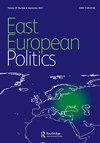Riding the Covid waves: authoritarian socio-economic responses of east central Europe’s anti-liberal governments
IF 3.1
2区 社会学
Q1 AREA STUDIES
引用次数: 7
Abstract
ABSTRACT The extraordinary context of the COVID-19 crisis gave governments around the world a freer hand to reshape their socio-economic orders. Political economists studying East Central Europe have started a debate in how far democratic backsliding in the region has ushered in a more authoritarian form of capitalism. Our paper examines responses to COVID-19 of four anti-liberal governments in the region: Hungary, Poland, Serbia, and Slovenia. Incorporating multiple case studies, it assesses the degree to which growing centralisation of political power has entrenched different mechanisms of authoritarian capitalism, as well as the limits to their use in different national contexts.乘着新冠肺炎浪潮:中东欧反自由主义政府的专制社会经济反应
2019冠状病毒病危机的特殊背景使世界各国政府能够更自由地重塑其社会经济秩序。研究东中欧的政治经济学家开始讨论,该地区的民主倒退在多大程度上导致了一种更专制的资本主义形式。我们的论文考察了该地区四个反自由主义政府(匈牙利、波兰、塞尔维亚和斯洛文尼亚)对COVID-19的反应。结合多个案例研究,它评估了政治权力日益集中在何种程度上确立了专制资本主义的不同机制,以及它们在不同国家背景下使用的限制。
本文章由计算机程序翻译,如有差异,请以英文原文为准。
求助全文
约1分钟内获得全文
求助全文

 求助内容:
求助内容: 应助结果提醒方式:
应助结果提醒方式:


